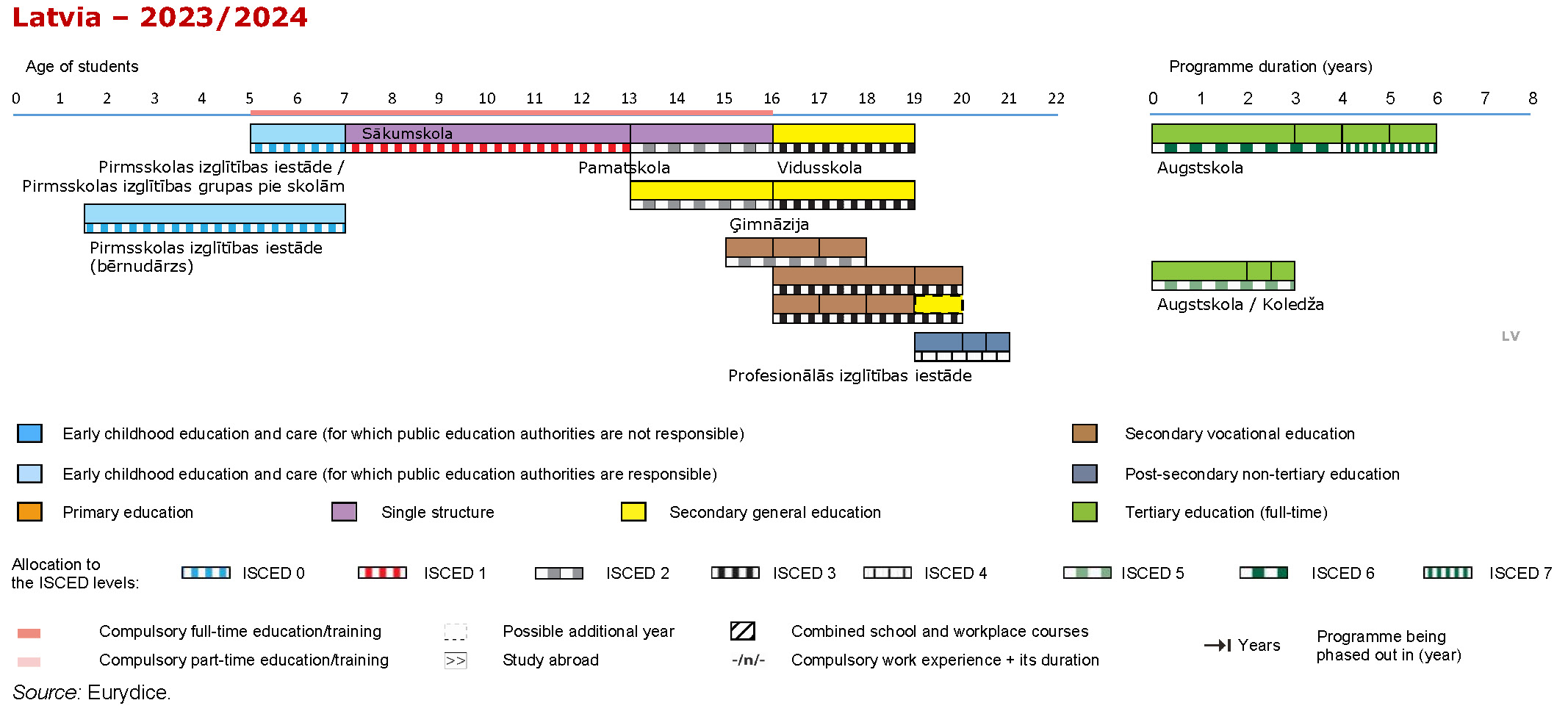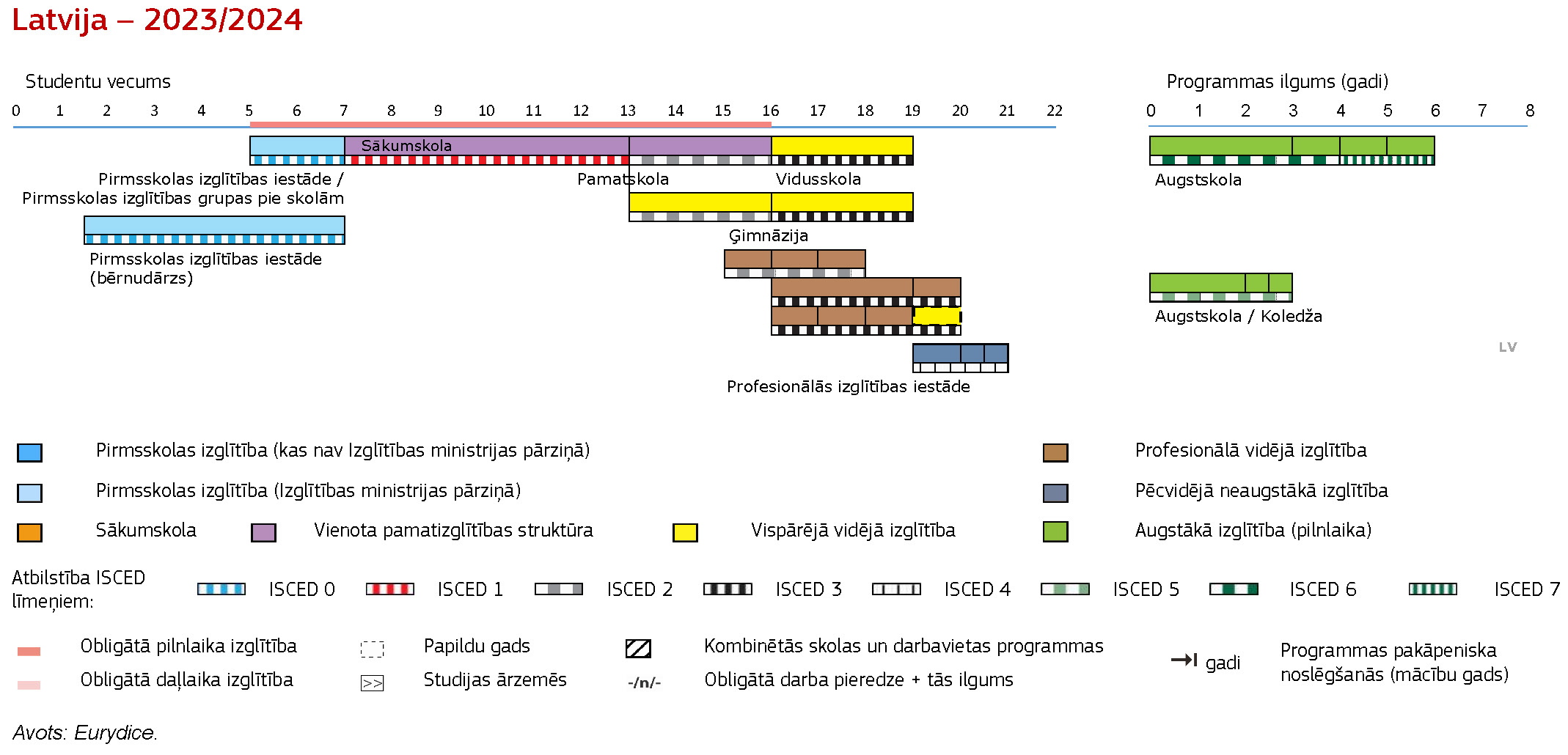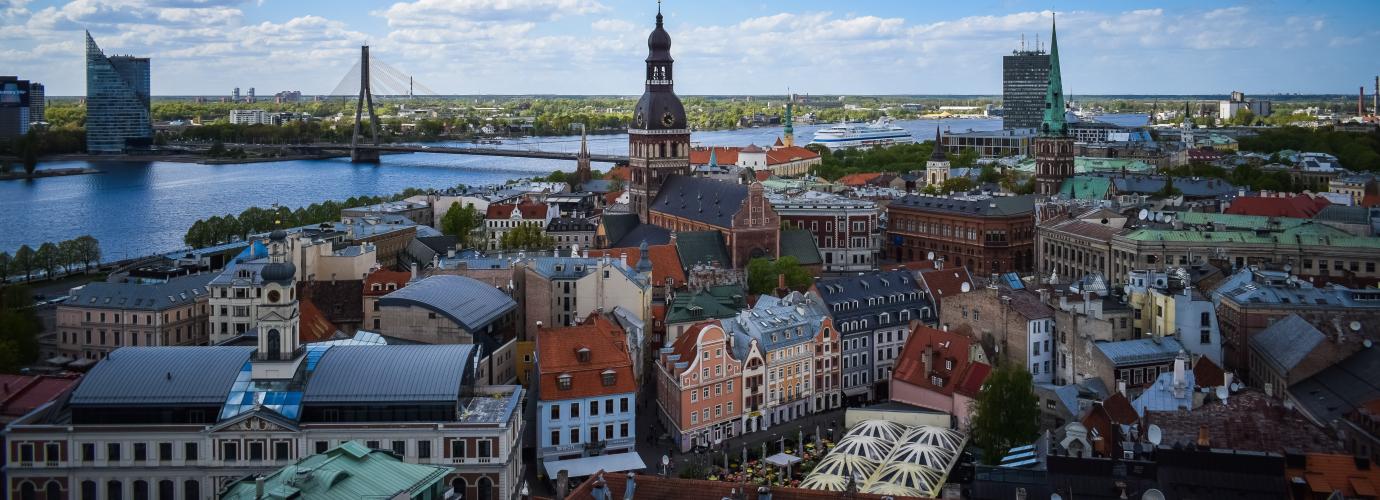Key features of the education system
Main aim of education policy in Latvia is to provide quality educational opportunities for all residents of Latvia in order to promote the development and realization of their potential throughout their lives and to develop their ability to change and responsibly manage constant changes in society and the economy.
Programme for International Student Assessment PISA 2022 lists Latvia’s education system as highly equitable. It means that education system of Latvia both attains higher overall performance and minimizes the impact of students’ socio-economic status on their performance.
According to international student assessment data, lower-secondary students (15-year-olds) in Latvia scored higher than the OECD average in mathematics and natural science, and almost at OECD average in reading. Latvia has a smaller proportion of students who lack basic skills, but the share of top-performing students is also smaller than the average in OECD countries.
To improve the quality and accessibility of special education, municipalities in Latvia invest 14.7 million euros from the European Union funding, promoting the learning performance of students, and creating a learning environment that promotes the well-being of students and teachers.
Government expenditure on education remained above the EU average in 2021, both as a share of GDP (5.6% against an EU average of 4.9%) and as a proportion of total government expenditure (12.6% against an EU average of 9.4%) but maintaining a large and inefficient school network weighs on resource allocation. A comparatively high share of Latvia’s education budget was spent on intermediate consumption (18.5%) and on gross capital formation (14%), well above the EU averages of 13.1% and 7.4% respectively, while teacher salaries accounted for 62.5% of education expenditure, compared to an EU average of 64.5%. The 2023 budget increases funding for education and science by more than EUR 180 million, to ensure salary increases for teachers, promote excellence in higher education, and increase science and research capacity for economic transformation.
In general education an improved competence-based education content was fully introduced by 2023. Share of population aged 25–34 with tertiary education attainment in Latvia is above the EU average, but adults' participation in lifelong learning, according to the Labour Force Survey, is below the EU average.
In 2022, the Parliament adopted amendments to the Education Law and the General Education Law, which provide for the transition to instruction only in the Latvian language within three years. According to the amendments to the laws, from September 1, 2023, the learning process is implemented only in the state language in preschool education and in grades 1, 4 and 7. From September 1, 2024, students of grades 2, 5, and 8 will start studying only in the state language, but from September 1, 2025, grades 3, 6, and 9 will also join. The opportunity to learn the language and cultural history of ethnic minorities is preserved - at the preschool and primary and lower-secondary education level, ethnic minority students will be able to learn the language and cultural history of ethnic minorities within the framework of the extra-curricular education programme.
A specific feature of education system in Latvia is vocationally oriented education in sports, art and music provided in music, art and sports schools (mūzikas skola, mākslas skola, sporta skola). It is the acquisition of systematized knowledge and skills, as well as the formation of values orientation in art, culture or sport concurrently with the basic (integrated primary and lower-secondary) education and upper-secondary education level. Vocationally oriented music and art education together with vocational education and higher education in music and arts compose Latvia’s culture education system (profesionālās kultūrizglītības sistēma).
Stages of the education system
Latvia provides a legal entitlement to early childhood education and care (ECEC, pirmsskolas izglītība) for all children from 1.5 years of age. Municipalities are obliged to ensure that children whose residence is declared in the administrative territory of the municipality are able to access ECEC the institution (pirmsskolas izglītības iestāde) closes to their home. ECEC for five- and six-year-old children is compulsory.
Primary and lower secondary education is organised as a single structure system (pamatizglītība or basic education), beginning at the age of 7 and consisting of nine years of compulsory schooling. Basic education ends after grade 9 with final examinations in student’s first language, the Latvian language for students in ethnic minority programmes, mathematics, history of Latvia and a foreign language, leading to the award of a certificate which is needed to entry into upper-secondary education.
Upper secondary education (vidējā izglītība) begins at the age of 16 and ends at the age of 19, and is provided in general and vocational pathways by vidusskola, ģimnāzija and profesionālās izglītības iestāde. Although upper-secondary education is not compulsory, the proportion of population with completed upper secondary education is still high and above the OECD average.
Various vocational upper-secondary education programmes take between two to four years to complete and led to different qualification levels. Most of vocational programmes start at upper-secondary level and only a few schools offer lower-secondary vocational education.
Higher education is provided by rather autonomous public and private higher education institutions (augstskola): these are universities (universitāte), offering both academic and professional tertiary programmes; other augstskola, akadēmija or koledža offer professional tertiary programmes. The degree structure follows the three-cycle structure: bachelor’s, master’s and doctoral level studies.
There is a spectrum of formal and non-formal education programmes and courses for the adult learners. Within formal education system, adult education extends over general education provided in pamatskola and vidusskola, vocational and further-vocational training offered by profesionālās izglītības iestāde, and higher education in augstskola. There are also various non-formal adult education opportunities provided by public and private education institutions and organizations. Informal learning acquired through working and personal life can be validated as professional competences acquired outside formal education.
Structure of the national education system


Useful links
While the Eurydice Description of National Education Systems provides comprehensive and comparable information, further information may also be found on the websites of Ministry of Education and Science, Academic Information Centre, the Central Statistical Bureau of Latvia as well as the Euroguidance Latvia, and Education GPS.
Common European reference tools provided by the Eurydice Network
- National Student Fee and Support Systems
- Organisation of the Academic Year in Higher Education
- Organisation of School Time in Europe (Primary and general secondary education)
- Recommended Annual Instruction Time in Full-Time Compulsory Education in Europe (Presented by grades/stages for full time compulsory education as well as by subject and country.)
- Teachers and School Heads Salaries and Allowances in Europe (Salaries and allowances of teachers and school heads at pre-primary, primary, lower secondary and upper secondary education levels.)

